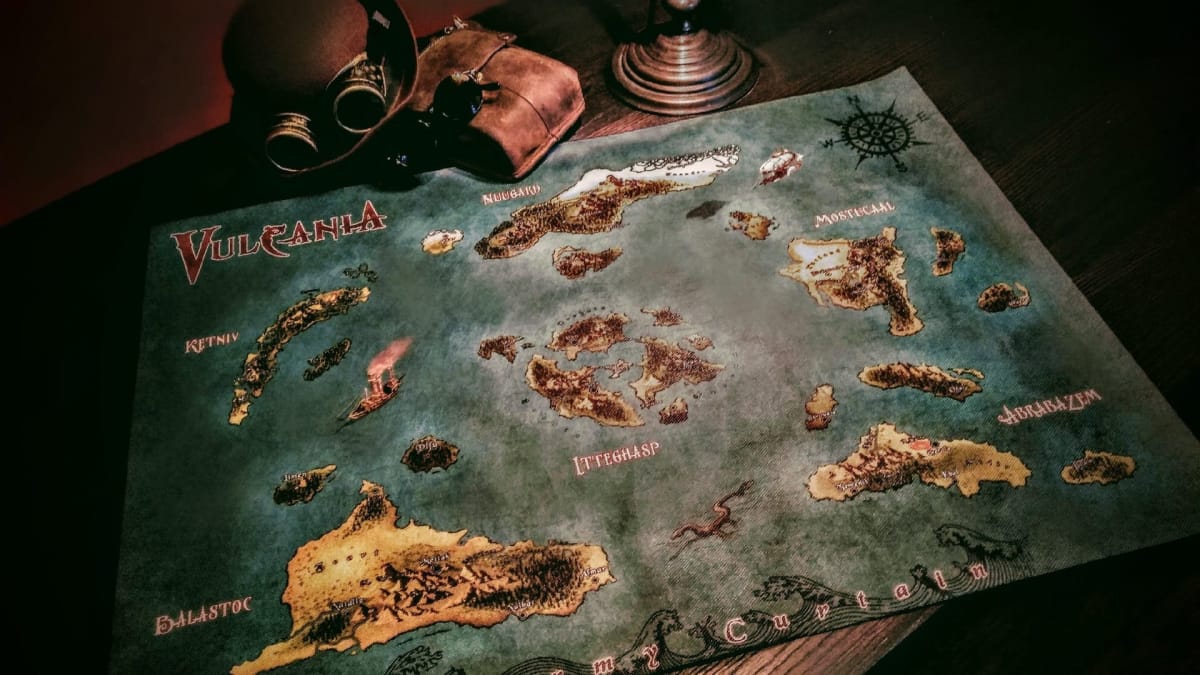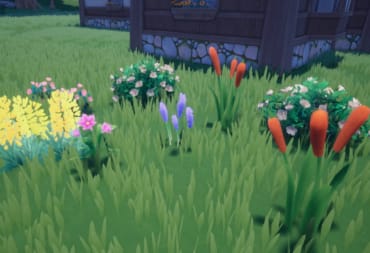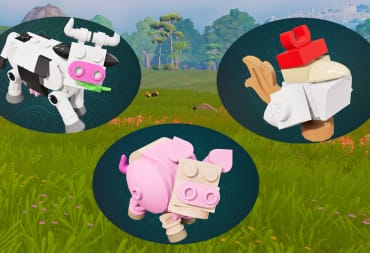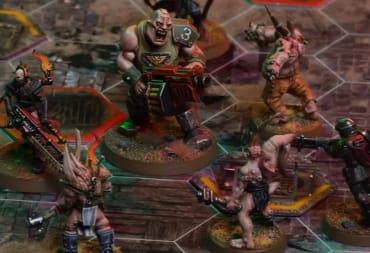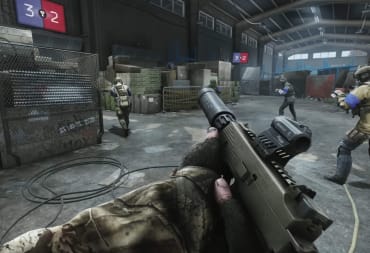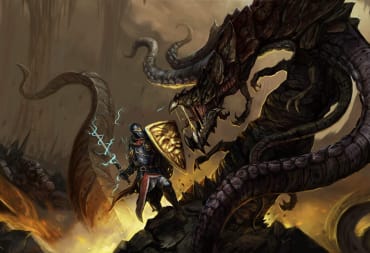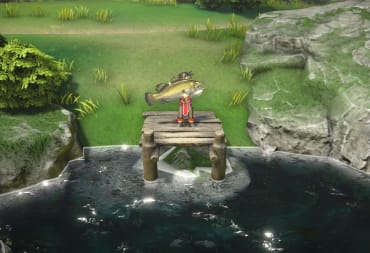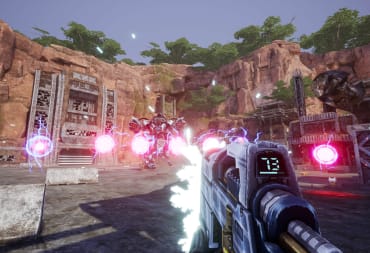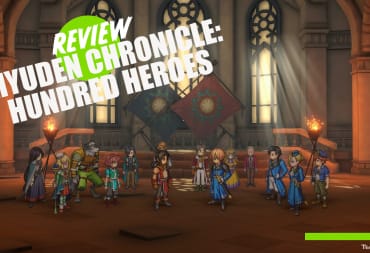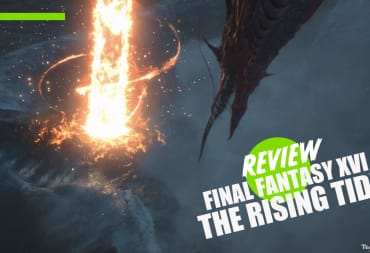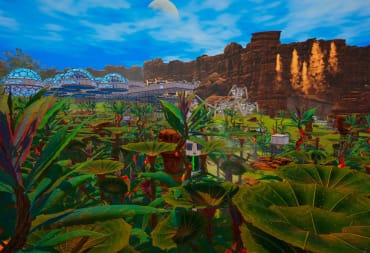When we first covered the Kickstarter campaign for Vulcania, the beautiful art, and the Steampunk setting captured our interest. When we got the chance to try a one-shot during the Modena Play event last year, we talked extensively about the simplicity and fun of its d12 system. I can now offer a deeper look into the game after getting a physical copy of the manual and playing the starting scenario. This review is long overdue, but we can finally showcase this ambitious RPG coming from the other side of the Ocean.
A note on localization: Vulcania is available in physical edition only in Italian at the time of writing while an English version is scheduled to come out this year. There should be no substantial difference between the two localizations content-wise but since the Italian version is the one object of review, some of the terms used in the article might differ from the ones in the official localization when it comes out.
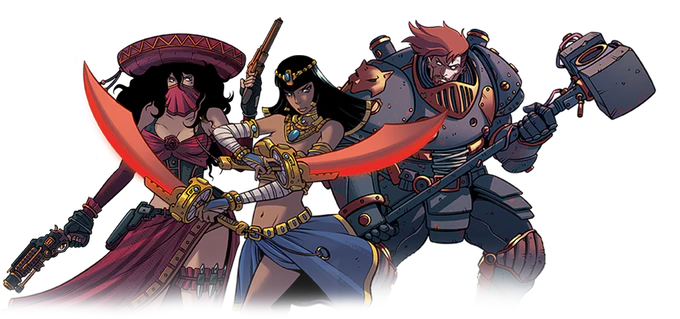
A World in Turmoil
The world of Vulcania is set in a world that is still recovering from a global war that brought massive socio-economical changes. The seven isle-nations that make up the entirety of the setting are still struggling with the consequence of the global conflict. The formerly rich continent of Abrabazem has been largely turned into a radioactive wasteland while the Mostucaal became a no man’s land after a civil war. The Theocracy of Balastoc is starting to open itself to the world under the new Red Popess while the economy of Itthegasp is thriving in the middle of all of this.
At the center of all this mess, sit the three Monopolies; three giant organizations that hold and guard the secrets of the technologies of the world. The Monopoly of the Alchemists know the mysteries around substances and mutagens used all around Vulcania, the Monopoly of Engineers hold the secret of the Vulcanus batteries, used to store and utilize the energy of the world’s Vulcanoes to operate machinery, and the Monopoly of Markonists is specialized in the study and usage of conlio, a rare metal that can be used to transmit thoughts.
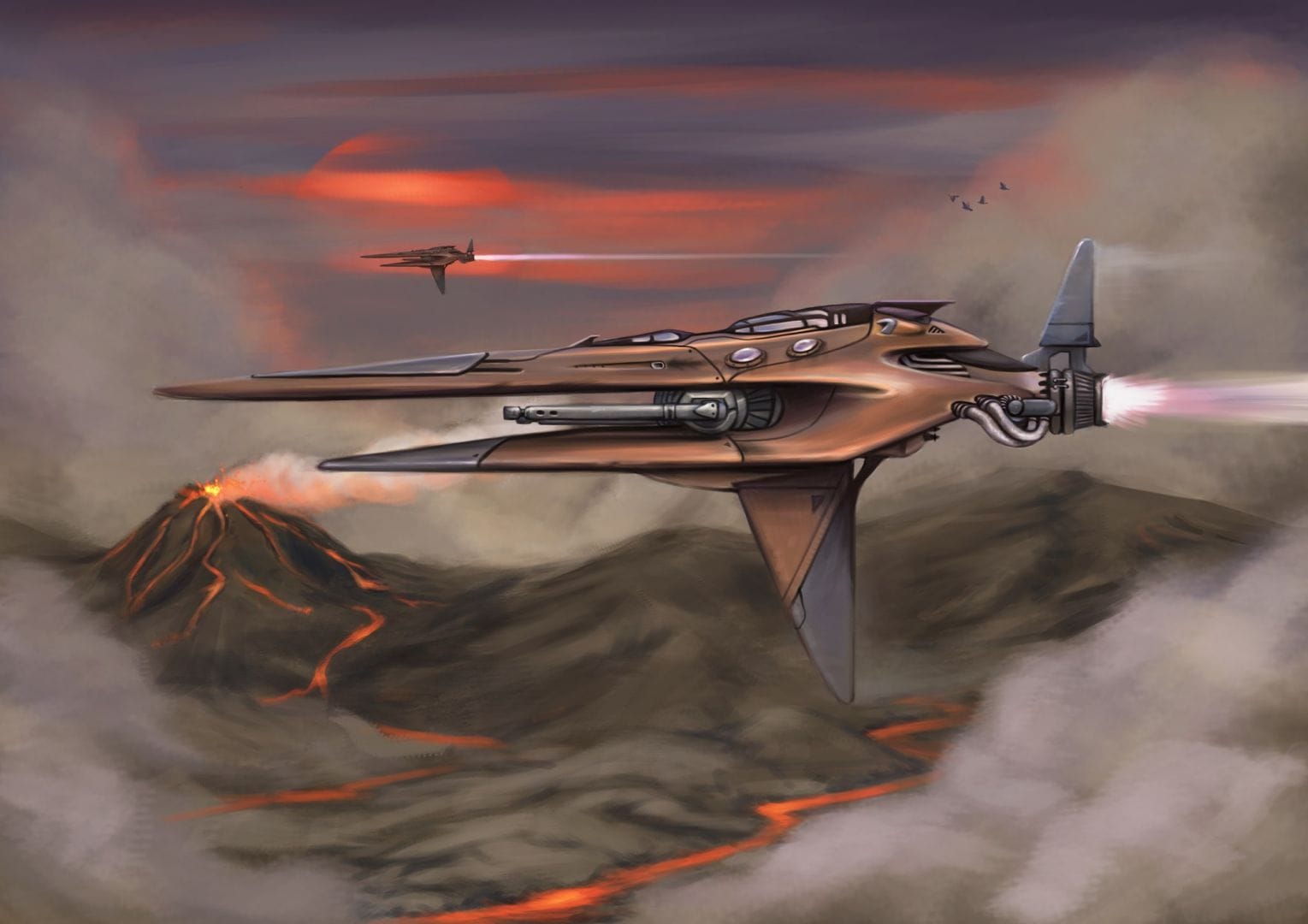
An Adventurer is Born
In this ever-changing world, the players will start their adventure by choosing an Origin and a Past. The Origin dictates what is their isle-nations of birth, gives them specific starting stat boosts and allows the player to choose a feature among an origin-specific array. For example, natives of Abrabazem might choose to choose the feature “mutation”, granting them a prehensile tail or snake eyes, or the “kissed by the fate” feature which grants them an additional gear of fate each play session (more on that later).
If a character’s Origin is basically the character’s “race”, the Past is their class. This choice dictates what the hero has been doing to earn a living up to the start of the adventure. Maybe they were a traveling acrobat, an Entropist of the Monopoly of Alchemists, a bounty hunter or a merchant or a Markonist specialized in Psionic. Each of these pasts will grant the character their starting equipment, money and skill modifiers and also act as a baseline for their role-playing. As an interesting note, there are seven regional pasts, one for each isle-nation, that can be accessed only by characters native of that place.
The choice of a character’s past also grants them their initial “Art”. Arts is how abilities are handled in Vulcania. Each art grants the player a different set of possible actions that can be performed by their avatar, like the ability to cripple a foe with a well-placed shot. Not all the arts are necessarily linked directly to combat. Arts like “surgeon” allow for treating injuries while some others like “juggler” give the possibility to escape restraints by dislocating thumbs or shoulders and even save yourself from a fall at the last moment.
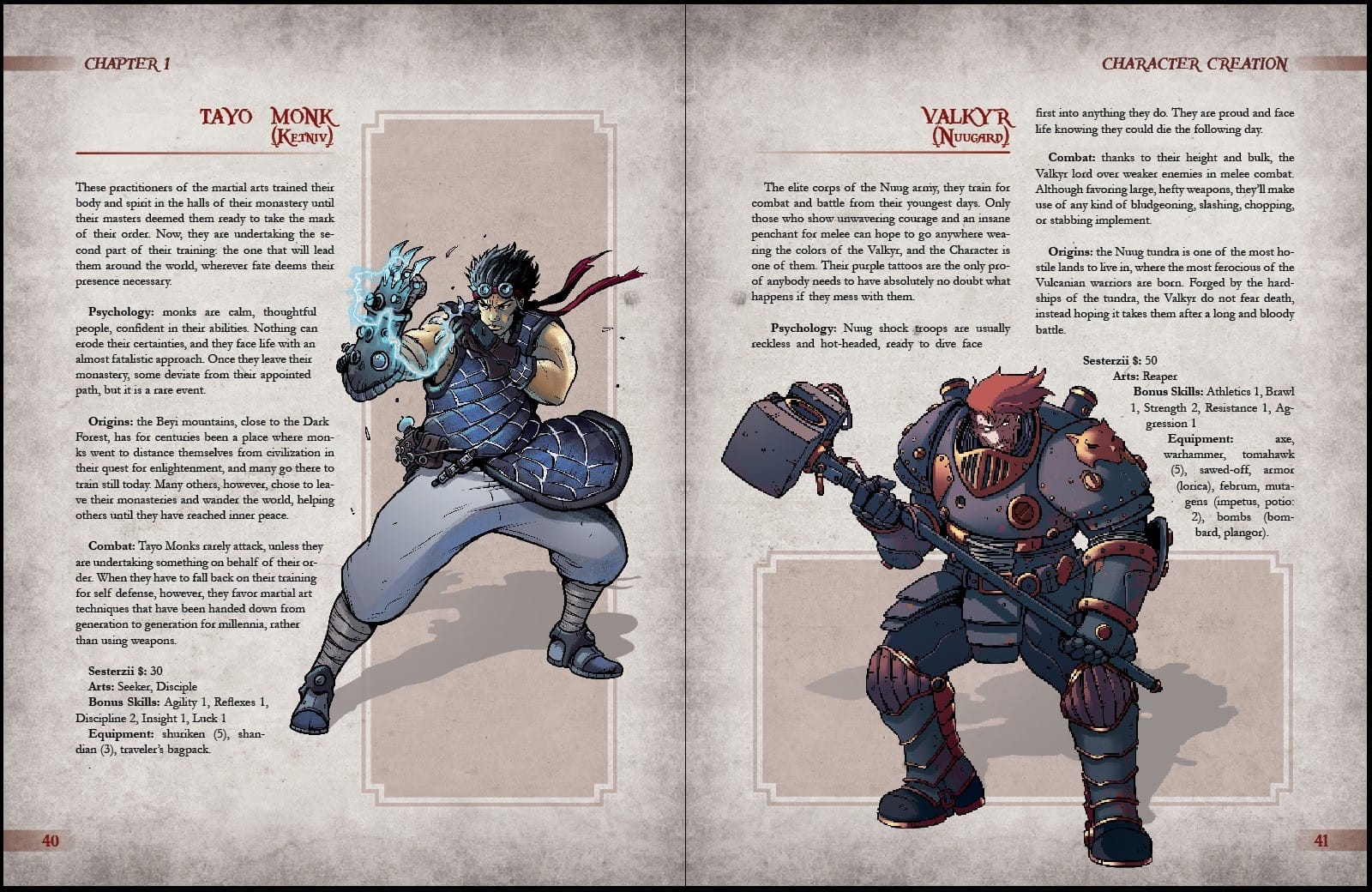
The good thing about the Art System is that it does not bind the players to their initial choice of origin and past. Once the baseline is set, the players can ideally learn any art in the game assuming that they fulfill the prerequisites (usually other lower-level arts), find a way to learn them, and have the necessary funds and time to invest. This can prompt the players to bring their characters towards unexpected directions.
Since we’ve established that a character can learn new arts virtually at any point, this begs the question of how the growth system as a whole works. Vulcania does not have experience points or levels so it might be difficult for the Narrator (Vulcania’s Game Master) to determine what challenges throw at the party. To overcome this issue, the game assigns a rank to the characters depending on their wealth (as indicated by the sum of the value of a character’s equipment and their arts) and their current ability points.
The abilities in Vulcania work a bit differently than other games. They are separated into four “scopes”, each with four derivate abilities. Each scope provides both a baseline and a cap for each specific ability. For example, the scope of “Vigor” represents how good is the character is at all things physical and provides a baseline for its derivate skills. For example, Athleticism is a skill under the scope of Vigor and thus a character’s total athleticism score will be its Vigor score plus the bonus skill points the player assigned to Athleticism. You can obtain skill points to assign from the Narrator as you would obtain experience in other games (i.e. as a reward for completing a quest). It’s not exactly straightforward as a system and it took a while for my party to wrap our heads around it but once it clicks, it works surprisingly well.
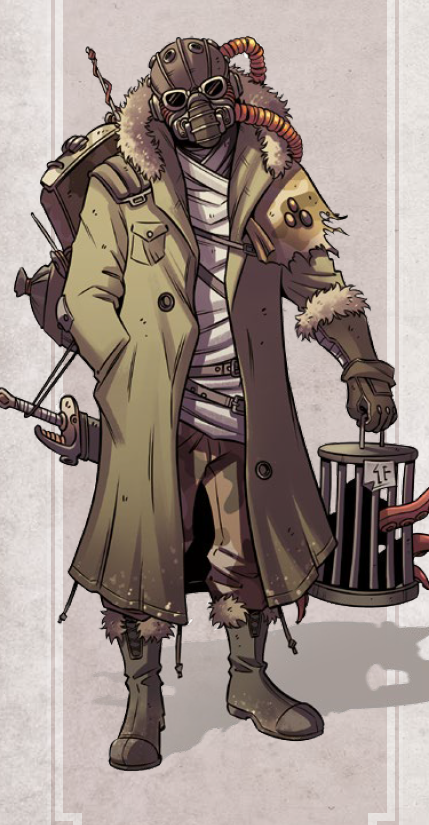
The Almighty d12
The game works around a pretty peculiar d12 system where the Narrator seldomly has to roll a dice, which is reminiscent of games such as Dungeon World. Each check is performed by the player rolling a d12, adding any relevant modifiers and checking the result against the Narrator’s Difficulty score. Interestingly enough, this includes combat encounters as well. When an enemy tries to hit a player, they do not roll to hit. It’s the player that has to roll for dodge (against melee) or elude (for ranged) and comparing the result against the foe’s flat attack score. On one hand, this removes a lot of work from the Narrator’s shoulders since they have less stuff to keep track of. At the same time, it’s harder for them to fudge the result in favor of the party in case of unfortunate rolls. This is where the opportunity and gears of fate systems come into play.
If a player rolls an 11 or a 12 (before modifiers), the check obtains an opportunity. This is just a way to say that the action was so good that something additional happens. Many arts and equipment grant special actions that can be performed using an opportunity. For example, the “Rifleman” art allows hitting a second target when the player rolls an opportunity on a ranged attack with a rifle. This does not mean that opportunities are necessarily something dictated by the manual. The player can propose how they want to use their opportunity and the Narrator can accept their proposal or reject it if too far-fetched. The other side of the coin is that when a player rolls a 1, they get an accident. This is basically the same as an opportunity but in the opposite direction. In combat, this means that the foes can use one of their opportunities against them or maybe the character fails to climb a table and falls prone. Out of combat, it might mean that they fumble with their words while trying to convince someone to help them prompting them to call the guards instead.
Opportunities and accidents are a big part of Vulcania’s system so it would be a waste to have them relegated to the extremes of a dice roll since the players would have few chances to take advantage of their arts. The aim of the Gears of Fate system is precisely to prevent this situation.
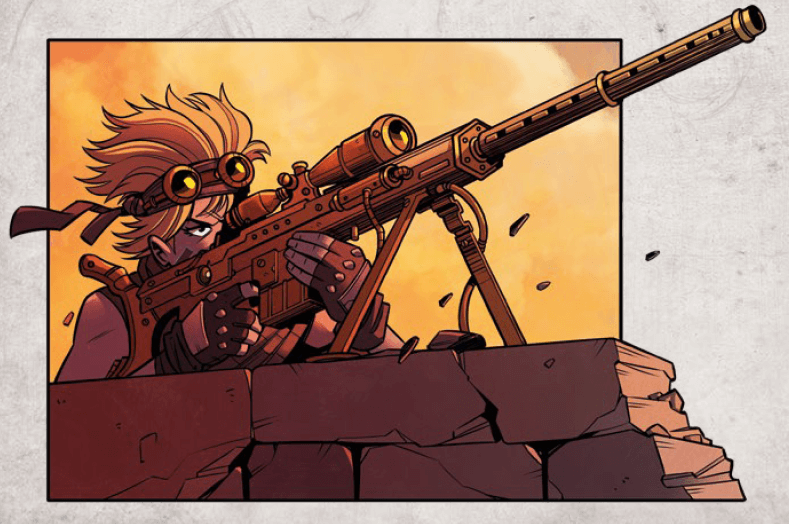
Each player starts each game session with three Gears of Fate tokens. They can use them to transform any success on a check to an opportunity, to remove an unfavorable condition (for example losing the disadvantage of moving through rough terrain) or even re-roll a bad dice. When a gear is spent, it goes to the Narrator that can, in turn, use them for their own ends, for example granting an NPC an opportunity or generally making the life of the party more challenging. The interesting thing about this system is that the gear goes back to the player who suffered the consequence, creating a dynamic of constant flowing of gears across the table which, in turn, prompts many interesting game situations. Pretty soon while testing the game, the players started using the gears for many different things which in turn prompted tha Narrator to use them as well in order to keep them circulating. This continuous exchange of tokens made the game all the more interesting since everyone started using the gears as a means to smooth situations that in other games would have halted the game, especially in a game that no one is experienced in.
The combat is pretty simple and straightforward. All characters roll their initiative and act in sequence. During their turn, a character can do a movement and an action (as in anything that requires a roll). The only thing I have an issue with is the system used for the damage. Each weapon has a bar with numbers from 1 to 12 in it where each number’s background has a different color. The player rolls to attack and, if it hits, the background of the result of the die (without any modifiers) indicates how much damage the attack did. On one hand, I can understand the reasoning behind this choice since in a steampunk world a pistol does the same amount of damage notwithstanding who’s holding it. That said, it feels like it creates a lot of reliance on equipment while still keeping the aleatory nature of a damage roll.
At the end of the day, Vulcania’s game system is not perfect but its simplicity and straightforwardness allow for both new and experienced players to enjoy it. The gears of fate and opportunity system create some beautiful and quick actions on the table that manage to tie the “rule of cool” to an actual gameplay system.
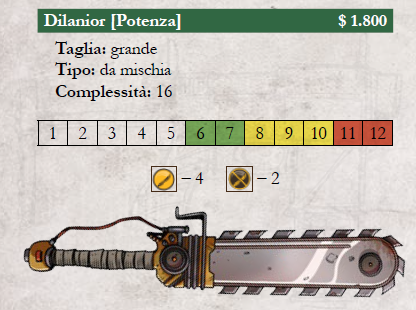
The Manual Containing it All
Let’s talk now about what you get for the price of entry. The entirety of Vulcania is contained in a single 455 pages hardcover manual which includes the rules for the players, the Narrator, the setting, enemies, equipment, arts, and even an introductory scenario. The manual itself is of pretty good quality and is filled with amazing and colorful art that really immerses you in this Steampunk world. I also appreciate the fact that the game does not take itself too seriously. There are various references to the real world and pop culture at many points of the manual, even though they might be a bit too much for some people (i.e. the max obtainable player rank is called Vin Diesel).
Unfortunately, at various points in the text, there are reminders of the fact that this is the first project for this game studio. There are a good number of typos and sometimes the same character or location will have its name spelled differently in two paragraphs. A great example of this is that the Valkyr (one of the available pasts) has “Intimidation” as one of its starting bonus skills. There is no such skill in the manual. It’s easy to understand that the skill meant to be there is “Aggression” while “Intimidation” is probably the remnant of an old draft. There are some other examples of this kind of error in the manual but they’re not really worth mentioning. All the errors and typos that I found did not affect the meaning of the text and I would expect that they will be fixed with the English localization. Still, it has to be said that the copy editing work is not as good as it should have been.
Another sore spot is the structure of the manual itself. Some information is repeated at different points in the manual, which makes it difficult to know where to go to get the information you need. It is also a chore looking up items because of the fact that often it is not clear where to look for a piece of equipment by its name alone. Many weapons, armor, and items have exquisite steampunk names but it’s sometimes impossible to guess in what category lookup for it by the name alone. For example, one of the main enemies of the starting campaign holds an item called “Harpago”. It’s a gauntlet with a miniature harpoon that can be used to pull enemies towards you and can be found under the “devices” category of the equipment chapter. The game is filled to the brim of items with such names as Faux, Iniquitor or Iuppiter which will force you to write the page of the manual beside them on the character sheet. The equipment and arts chapters could definitely use a reference table.
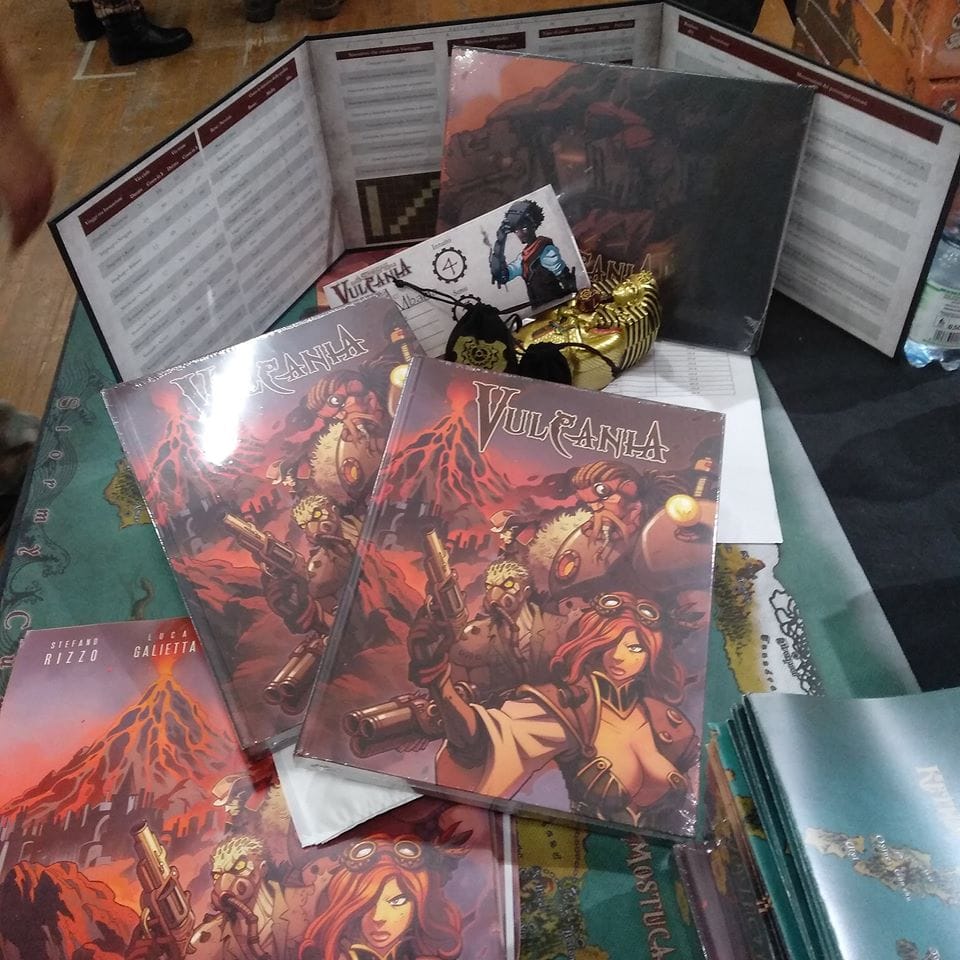
The part of the manual that really shines is the chapter about the setting. There is a lot of information about the history of the world of Vulcania and notable characters and places. It's amazing how many campaign ideas pop up in the mind by just reading these pages. It is well curated and does a great job of setting the foundations of any adventure.
As mentioned before, the manual also includes an introductory mini-campaign with the purpose of guiding new players through the system. The campaign itself is simple enough but very serviceable considering its aims. The only gripe I had with it is that it seems designed for players that are new to RPGs in general and, therefore, feel too much railroaded for anyone with a modicum of experience. While this might seem like a shortcoming, it's probably by design. After all, this is a campaign that is designed to make players accustomed to the world of Vulcania and its rules. The positive thing is that this limitation allows to experiment with the rules. In my experience as a Narrator, I found out that it’s extremely simple to improvise using Vulcania’s ruleset.
As an example, at one point in the adventure, the party finds itself on an overcrowded train to the point of making movement extremely difficult. The manual suggests that the players should wait until the train unloads some people to make their way to their target. Of course, having experienced players at the table, sitting idle was not an option so they made their way to the roof of the train and started proceeding from there. Using the Vulcania system, it was pretty easy for me to make up on the fly the skill checks they needed to pass to not fall over the moving train and to manage the subsequent fight on the roof. Considering everyone was new to the game, the whole ordeal proceeded surprisingly smoothly thanks to the simple system and the gears of fate.
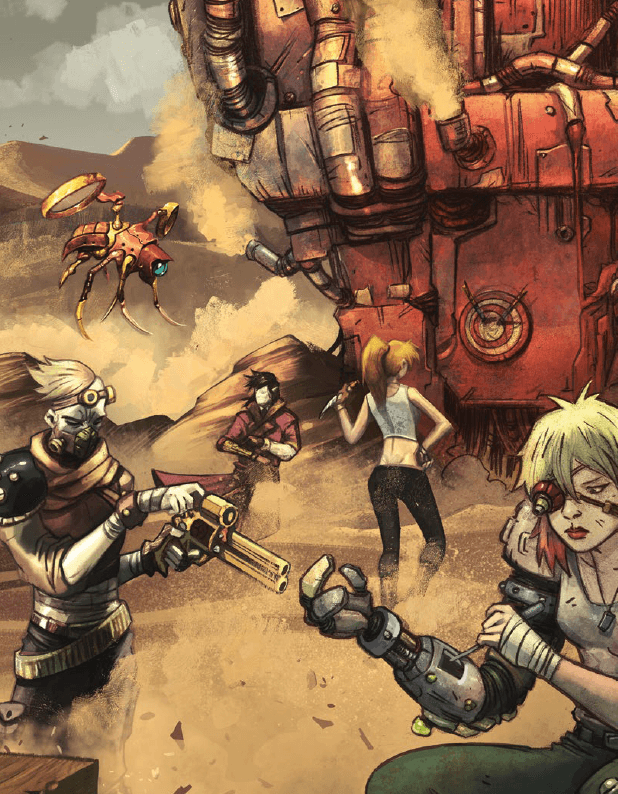
The Bottom Line:
Vulcania is a great game for both newcomers and veterans of the RPG scene. It is perfect for groups that prefer more freedom of action over a strict ruleset that dictates your every move. The world is vibrant and rich in detail with endless opportunities for the players to explore in their adventures. While the system is not flawless and the manual is not free from issues, Gear Games’ first game is definitely worth considering.
Get this game if:
- You love Steampunk worlds
- You’re looking for a system that grants a lot of freedom to the player
- You like the idea of bribing fate with tokens
Avoid this game if:
- You’re looking a mechanics heavy RPG
- You like to roll a ton of dice
- References to pop-culture irk you
The copy of Vulcania used for this review was purchased by the reviewer.
Review Summary
Have a tip, or want to point out something we missed? Leave a Comment or e-mail us at tips@techraptor.net
